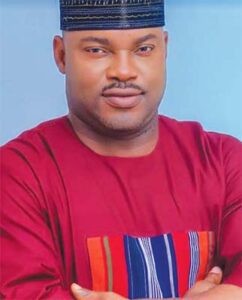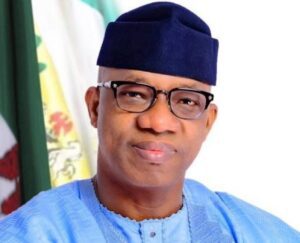5G: Nigeria eyes $100bn dollars — ATCON former President, Teniola
…stresses 5G is ecosystem creator with multiplier effects on Nation’s Economy
Fifth Generation Technology (5G) has been central in Nigeria’s public discourse. OGAGA ARIEMU, REPORTER, NIGERIAN NEWSDIRECT in this interview with the immediate Past President of the Association of Telecommunications Companies of Nigeria (ATCON) and Nigeria National Coordinator for the Alliance for Affordable Internet (A4AI.org), Olushola Teniola, x-strayed the impact, prospects, challenges of 5G and Information Communications Technology. Teniola was a member of the Nigerian National Broadband Plan 2020-2025 Committee, and is currently a member of the Broadband Implementation Steering Committee of Nigeria (BISC). He was also a member of the Cyber Security Committee that reviewed the 2014 Cyber Policy and Strategy Structures, documented and created the current Cyber Security Policy and Strategy Policy of 2021. According to him 5G is an ecosystem creator. He noted that Nigeria can earn a projected $US100 billion from 5G. However, he revealed that this feat may not be attained without the targeted 90 per cent deployment of Fourth Generation (4G) by 2025, indicating that, a successful 4G implementation will have multiplier effects on the Nation’s economy across the 36 states of the Country, including the Federal Capital Territory (FCT). Excerpts:
World Economic Forum (WEF) in 2017 stated that 5G technology can avail the world $12 trillion dollars revenue by 2030. With this in mind, what is the economic impact of 5G network deployment in Nigeria?
It is very important to address two areas. First, in our journey as a nation, we are still playing catch up in terms of deployment of 4G. And if we achieve the penetration that we are intending to achieve with Fourth Generation(4G), which is 90 per cent coverage by 2025, then you will see a multiplier effect on some of the applications that will be used across the 36 states, including the Federal Capital Territory (FCT). It will generate $90 to $100 billion dollars by 2030. On the back of that, you can’t do 5G without the 4G? That is impossible. And there is a reason, because the early release of 5G has been on spectrum that is currently available and being used in Nigeria, which is the 3.5 gigahertz that one of our operators tested in the end of 2019. So, because of that, it assumes that you have a 4G base. Yes, there are new releases of 5G: Really some team, I believe, of the 3rd Generation Partnership Projects (3GPP), which is a standard organisation that has just come out recently, that can give you 5G quotes and stand alone without a 4G base. But that is very complex and is very rare. And I think that personally, just to give you context, it will only be used in small deployments, that is, in specific enterprises, or for specific cases, which really, I think in terms of Africa, we are still on a journey. We’re being very specific for your question. You’re actually looking at what exactly will it do for Nigeria? So let me get to that point. Because once I’ve set the context, then you understand that really, in terms of 5G, we as a country, we cannot be left behind. I mentioned that we’re the largest mobile telecommunications market in Africa. That’s the fact. And at the moment, when you look at the amount of investments made to get us from where we started off back in 2001 when GSM was introduced, to now, which is pretty some years, then you can see really, the type of investment we put in; which is about $72 billion till date to generate this large market. So, we need to consolidate on that and the only way to consolidate is that you continue to invest and we see that we need to invest another $70 billion dollars or so, to replicate the successes of the voice markets that we’ve got right now in Nigeria. The applications that we’ll be looking at are applications that really have been tested in 4G – what are they? – E-learning, Tele-medicine, even to Digital financial services, whereby we in Nigeria want to increase financial inclusion to 80 per cent by 2030. So, we really have those indices that indicate that roughly right now, if we were to continue on the trajectory of actually achieving 90 per cent, broadband penetration of 4G, then we can see a sizable economy. Currently, right now, we can increase in terms of GDP contribution, another $60 to $90 billion by adding to the coverage of 4G on our economy by 2025. So, what happens after 2025? Assuming that we’ve achieved that, then really, the next phase will be 5G. Once you have it established, we really have 5G as a mass market product post-2025. Right now, we need to actually plan. And what does that mean? First, we need spectrum. So, we need to do some work on that to ensure the availability of large bandwidth to be able to achieve the types of speeds and the low latency that 5G can offer. So, when you’ve achieved that, then you can actually open up the ecosystem to these new services, which are far and beyond, which is really about the Fourth Industrial Revolution. I think that’s what we engineers have engineered for Fourth Industrial Revolution to really kick off around 2025, 2026 and 2027. That’s really when there’ll be lower cost devices or anticipated low-cost devices for 5G, and our population would have grown a lot more since the younger people will come into the market. And then hopefully there will be jobs – potential jobs in the sectors that are attractive around this 5G technology. So 5G technology really is an ecosystem creator not just about news feeds, or next generation, it goes beyond that, because it allows a lot more services to be actually introduced into the society. So typically, you mentioned $12trillion economic benefits of 5G by 2030. Globally, there’s been research that says digital economy can produce maybe $16trillion worth of value. And really, we will say Nigeria at the moment is a $450 billion GDP economy. So, we would like to think that with all industries utilising 5G by 2030, we’ll be looking at another contribution of $200 to $300 billion on top of what the economy currently has by 2030, provided all things being equal.
There seems to be rapid growth in the Telecommunications industry, recent data released by National Bureau of Statistics (NBS), said the Information and Communications Technology (ICT) Sector contributed 17.92% per cent to the Nation’s Gross Domestic Product (GDP) in the second Quarter of 2021, what can be done to upscale this figure?
We agree as an industry. However, the growth, of recent, has slowed down. It’s not as rapid as you stated – definitely not double digits. So, I think personally, in terms of moving on, you mentioned a very good point. We need to be able to create an enabling environment. The whole macroeconomic situation that Nigeria finds herself post COVID-19 has caused uncertainty for investors. Yes, Nigeria is an attractive proposition, but we need to move past potential and proposition to actuality. I think that’s the gap. Now, we have a lot of people who are talking about Nigeria, but they’re not actually translating that talk into action. And I think the only way you can get them away from talking more, but converting talk into money in terms of the capital 5G deployment requires, is to create an enabling environment, which is the most important thing. And what does that mean, we need to solve this issue of the Foreign Exchange (Forex). Right now, as I speak to you, Forex has gone up to NGN557 (Naira to Dollar) in the parallel market. As you can see, there’s a shortage of supply of dollars. If this is not addressed, demands will be so great, and that’s a concern because with the volatile currency, it’s very difficult to plan. A lot of infrastructure is import dependent, and it’s in dollars. So, that’s the first thing that’s a big overhang. An investor needs to have certainty that if they’re entering the market, they can exit at a certain point with a degree of confidence. I think that needs to be addressed.
Secondly, we battle with multiple tax conundrums. We can’t be in a situation where we have multiple regulators introducing different charges on what is considered a converged technology. The technology convergence is not about multimedia, not about broadcast, not about voice being separate, but it is all encompassing. And then you have this struggle when the industry is being targeted from different angles. Yes, I understand and appreciate it’s a multi-regulatory environment, but I think we need harmonisation. So, we don’t overtax, not only the supply side, but most importantly the demand-side which are the consumers. Otherwise, it would be too expensive. So, the concern you raised would be that we only invest in areas that can give us a return on investment. Therefore, those that are in underserved and in rural areas will never be served. That’s a concern.
Finally, all we need to do is to really get the government to digitise their processes. Government is the biggest spender at the moment. The Federal Government is borrowing a lot of funds or loans that should be converted into making government more efficient. And through efficiency, they will actually adopt and utilise technology and that technology sits on the enabling infrastructure which is telecoms, so that we will have the rippling effects and improve job creation for the youth. With this, the gap will be addressed.
Nigeria’s debt currently stands at N33.107tillion according to Debt Management Office (DMO), this is in addition to the $400 million loan for the Nigeria National Information and Communication Technology (ICT) Infrastructure Backbone Phase II Project from China, has this loan been able to address the telecommunications infrastructural gap?
The straightforward answer to that, and the important question is that the infrastructure gap that we in the telecom sector have observed amounts to $3 billion a year, for the next 10 years. Right now, the broadband plan identified that if we were to implement the 55 recommendations as proposed, by the 2020 -2025 by Broadband Plan, approximately anything from $3.5 billion to $5 billion will be required to complete it. So, when you sit down against the loan that had been or is to be collected by Galaxy Backbone, which is approximately to the tune of $350 million, then it is a small part of that overall task, or request that is required to solve the infrastructure gap. So, when you try and balance all this, I would say that the flip side Galaxy Backbone’s focus is to build the government networks as they are mandated as the ICT provider for all government agencies. So really, I think that the network that they built has demonstrated that they have done something when there was nothing for government in the past. Next question would be okay, what is the next thing or expected outcome? What is the benefit procured? I think that’s the question you should ask the citizens because, obviously, they’ve built a network for government and they are still on that journey. And I think that they will need to do more than just build the networks. Because, obviously, telecommunication business is very capital-intensive. It is more than just trying to build some aspects of telephony or telecoms; it also encompasses automation with ICT services (e.g. e-Government) beyond just Telecoms. So, in my opinion, I think it’s a bit too early to try and quantify exactly what the impact is, in terms of the economic sense of the word.
But a more relevant question; Where does galaxy backbone sit in the whole ecosystem? I think that one of the answers to that is that Galaxy Backbone is seen as just being another wholesale provider. If that is the case, then ideally we should be able to leverage on all the government infrastructure to be able to deliver services to all our communities.
Recently, the National Information Technology Development Agency (NITDA) raised alarm on cyberattack of Apple Products and Ramsomware attacks on organisations, how can these cyber security vulnerabilities be addressed in Nigeria?
Yes again, one of the concerns that we have with the proliferation of many devices, especially smartphone devices, is that the devices are being produced and then they go for general availability into the market without enough testing (both stress testing and regressive testing). With stress testing, then a lot of these vulnerabilities that have been noted and raised as concerns by NITDA wouldn’t be there. I think that there has to be an opportunity when it comes to working and collaboration for NITDA to also work with security and other multi stakeholders including the Office of National Security Adviser (ONSA), and the Nigeria Customs Service (NSC) with the Standards Organisation of Nigeria (SON) and others, to come together towards coming up with a system where there’s an ability to do further testing on these products before they are put into the market in Nigeria. Otherwise, what will happen is that the vulnerabilities that currently exist in those products will be found out by the consumers. Sometimes it’s a bit too late, obviously, if you have suffered data breaches. And that’s difficult. So, yes, it is right to make the public aware of concerns and the vulnerabilities that exist in the products that you’ve just highlighted. But it’s not just unique to that particular company and product line – there are other wider concerns generally about the complexities of some of these devices and definitely the interactions with the software. Especially, the applications that are on these devices sometimes have some gaps because they haven’t been fully stress tested.




